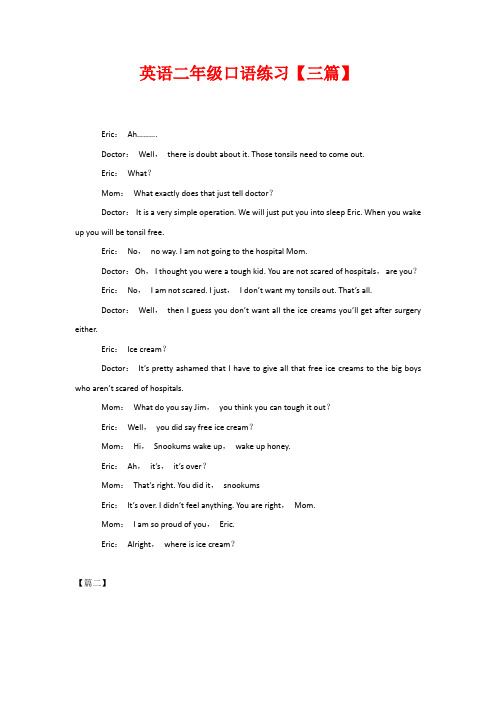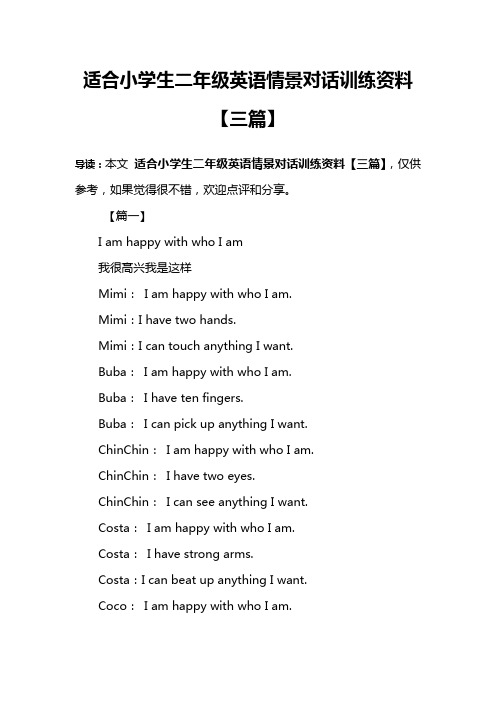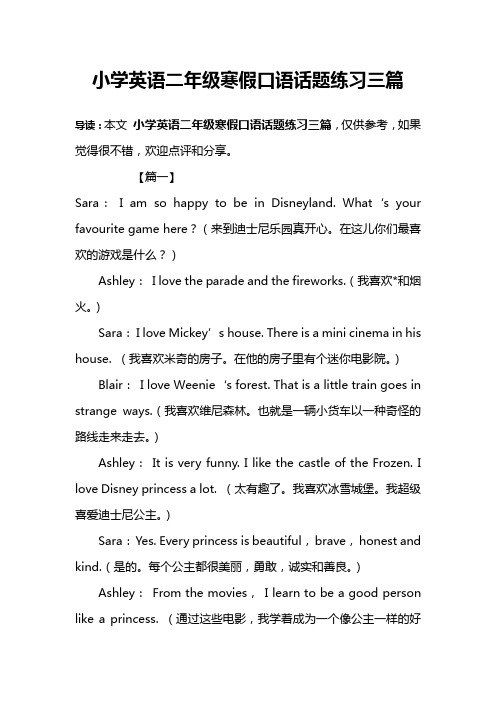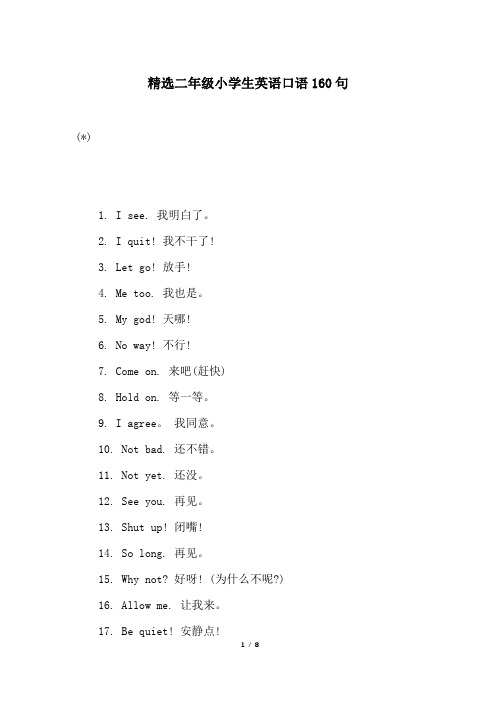最新整理小学生二年级英语口语练习素材
- 格式:doc
- 大小:300.00 KB
- 文档页数:4

二年级英语口语练习题库1. What's Your Name and Age?(你的名字和年龄是什么?)My name is Lily and I am 7 years old.- What's your name and age?(你的名字和年龄是什么?)- My name is Tom and I am 8 years old.2. Where are You From?(你来自哪里?)I am from Beijing, China.- Where are you from?(你来自哪里?)- I am from New York, USA.3. What's Your Favourite Color?(你最喜欢的颜色是什么?)My favourite color is blue.- What's your favourite color?(你最喜欢的颜色是什么?)- My favourite color is pink.4. Do You Have any Pets?(你有宠物吗?)Yes, I have a dog named Max.- Do you have any pets?(你有宠物吗?)- No, I don't have any pets.5. What's Your Hobby?(你的爱好是什么?)My hobby is drawing pictures.- What's your hobby?(你的爱好是什么?)- My hobby is playing soccer.6. What's Your Favourite Animal?(你最喜欢的动物是什么?)My favourite animal is a dolphin.- What's your favourite animal?(你最喜欢的动物是什么?)- My favourite animal is a lion.7. How Many Siblings Do You Have?(你有几个兄弟姐妹?)I have one sister and one brother.- How many siblings do you have?(你有几个兄弟姐妹?)- I have two brothers.8. What's Your Favourite Food?(你最喜欢的食物是什么?)My favourite food is pizza.- What's your favourite food?(你最喜欢的食物是什么?)- My favourite food is ice cream.9. Can You Sing a Song?(你会唱歌吗?)Yes, I can sing "Twinkle Twinkle Little Star".- Can you sing a song?(你会唱歌吗?)- No, I can't sing.10. What's Your Favourite Subject?(你最喜欢的科目是什么?)My favourite subject is English.- What's your favourite subject?(你最喜欢的科目是什么?)- My favourite subject is math.。

英语二年级口语练习【三篇】Eric:Ah……….Doctor:Well,there is doubt about it. Those tonsils need to come out.Eric:What?Mom:What exactly does that just tell doctor?Doctor:It is a very simple operation. We will just put you into sleep Eric. When you wake up you will be tonsil free.Eric:No,no way. I am not going to the hospital Mom.Doctor:Oh,I thought you were a tough kid. You are not scared of hospitals,are you?Eric:No,I am not scared. I just,I don’t want my tonsils out. That’s all.Doctor:Well,then I guess you don’t want all the ice creams you’ll get after surgery either.Eric:Ice cream?Doctor:It’s pretty ashamed that I have to give all that free ice creams to the big boys who aren’t scared of hospitals.Mom:What do you say Jim,you think you can tough it out?Eric:Well,you did say free ice cream?Mom:Hi,Snookums wake up,wake up honey.Eric:Ah,it’s,it’s over?Mom:That’s right. You did it,snookumsEric:It’s over. I didn’t feel anything. You are right,Mom.Mom:I am so proud of you,Eric.Eric:Alright,where is ice cream?【篇二】A Shooting StarA shooting star streak to cross the dark sky at night and completed his final sprint with his life then disappeared. The stars around him were looking on his final result and discussing in a low voice. “How stupid you was!”“He was damaged in the end in order to steal the limelight.” “It was not worth a rap!” “Her real fool!” Now on the earth,there was a boy watching the shooting star. He opened his eyes widely and still tried to find the track that was straight by the shooting star. He praised:“How beautiful is the shooting star!He didn‘t care about his life to lighten the dark sky. He believes that his light has been mixed with the dawn.【篇三】The three fishThis is a story of the lake and the three big fish that were in it,one of them intelligent,another half-intelligent,and the third,stupid.Some fisherman came to the edge of the lake with their nets. The three fish saw them.The intelligent fish decided at once to leave,to make the long,difficult trip to the ocean. He thought,“I won‘t consult with these two on this. They will only weaken my resolve,because they love this place so. They call it home. Their ignorance will keep them here.”The wise fish saw the men and their nets and said,“I”m leaving.“ The half-intelligent fish thought,“My guide has gone. I ought to have gone with him,but I didn’t,and now I‘ve lost my chance to escape. I wish I’d gone with him.He mourns the absence of his guide for a while,and then thinks,“What can I do to save myself from these men and their nets?Perhaps if I pretend to be already dead!I‘ll belly up on the surface and float like weeds float,just giving myself totally to the water. To die before I die.”So he did that. He bobbed up and down,helpless,within arm’s reach of the fishermen.“Look at this!The best and biggest fish is dead.” One of the men lifted him by the tail,spat on him,and threw him up on the ground. He rolled over and over and slid secretly near the water,and then,back in.Meanwhile,the third fish,the dumb one,was agitatedly jumping about,trying to escape with his agility and cleverness.The net,of course,finally closed around him,and as he lay in the terrible frying-pan bed,he thought,“If I get out of this,I‘ll never live again in the limits of the lake. Next time,the ocean!I’ll make the infinite my home.”。

适合小学生二年级英语情景对话训练资料【三篇】导读:本文适合小学生二年级英语情景对话训练资料【三篇】,仅供参考,如果觉得很不错,欢迎点评和分享。
【篇一】I am happy with who I am我很高兴我是这样Mimi:I am happy with who I am.Mimi:I have two hands.Mimi:I can touch anything I want.Buba:I am happy with who I am.Buba:I have ten fingers.Buba:I can pick up anything I want.ChinChin:I am happy with who I am.ChinChin:I have two eyes.ChinChin:I can see anything I want.Costa:I am happy with who I am.Costa:I have strong arms.Costa:I can beat up anything I want.Coco:I am happy with who I am.Coco:I have a big mouth. Coco:I can eat anything I want. Cosmi:I am happy with who I am. Cosmi:I have a pretty face. Cosmi:So everywone loves me!>>中文翻译*:我很高兴我是这样。
*:我有两只手。
*:我可以碰任何东西。
布巴:我很高兴我是这样布巴:我有十个手指。
布巴:我可以拿起任何我想要的东西。
晨晨:我很高兴我是这样晨晨:我有两只眼睛。
晨晨:我可以看到任何我想要看的东西。
科斯达:我很高兴我是这样。
科斯达:我有强壮的手臂。
科斯达:我能打败任何我想要打败的。
可可:我很高兴我是这样。

小学英语二年级寒假口语话题练习三篇导读:本文小学英语二年级寒假口语话题练习三篇,仅供参考,如果觉得很不错,欢迎点评和分享。
【篇一】Sara:I am so happy to be in Disneyland. What‘s your favourite game here?(来到迪士尼乐园真开心。
在这儿你们最喜欢的游戏是什么?)Ashley:I love the parade and the fireworks.(我喜欢*和烟火。
)Sara:I love Mickey’s house. There is a mini cinema in his house. (我喜欢米奇的房子。
在他的房子里有个迷你电影院。
)Blair:I love Weenie‘s forest. That is a little train goes in strange ways.(我喜欢维尼森林。
也就是一辆小货车以一种奇怪的路线走来走去。
)Ashley:It is very funny. I like the castle of the Frozen. I love Disney princess a lot. (太有趣了。
我喜欢冰雪城堡。
我超级喜爱迪士尼公主。
)Sara:Yes. Every princess is beautiful,brave,honest and kind.(是的。
每个公主都很美丽,勇敢,诚实和善良。
)Ashley:From the movies,I learn to be a good person like a princess. (通过这些电影,我学着成为一个像公主一样的好人。
)Sara:Yes,and I understand the meaning of friends.(是的,并且我也理解了朋友的意义。
)Blair:You bet.(一点儿也没错。
)Sara:What’s more,the food here is yummy,too.(还有这儿的食物也很美味。

小学英语二年级口语练习辅导【篇一】What’s your job?Hello,everyone. 今天在这里和大家来分享一段情景对话:Tim想了解妈妈的工作,他要去参观妈妈工作的地方。
我们快来看看他们的对话是如何展开的吧。
Tim:Mum,what‘s your job?(妈妈,你是做什么工作的?)Tim’s mum:I am a narrator.(我是一名解说员。
)Tim:Oh,what‘s that about?(哦,那是干什么的?)Tim’s mum:Well,do you remember when we go to Louvre?(嗯,你还记得我们去卢浮宫吗?)Tim:Yes,they have a earphone thing,You can hear from that.(记得。
他们有一个像耳机一样的东西,从那里边你能听到声音。
)Tim’s mum:Well,I work at the Imperial Palace,and we tell visitors about the stories there. (对的。
我在故宫工作,并且我们给游客讲述这的故事。
)Tim:Oh,you are the ear phone.(哦,你就是耳机呀。
)Tim’s mum:Yes,you can put it this way. It is funny.How about you come to my place and have a look?(是,你也可以这么理解。
真有趣。
你来我工作的地方看看怎么样?)Tim:May I?(我可以吗?)Tim’s mum:Why not?(怎么不可以?)At the Imperial Palace(在故宫)Tim’s mum:Look. Over there,behind the ticket office,there is my office,here is my work-card,and this is my speaker. (看那,在售票处的后面是我的办公室,这是我的工作证和扩音器。

精选二年级小学生英语口语160句(*)1. I see. 我明白了。
2. I quit! 我不干了!3. Let go! 放手!4. Me too. 我也是。
5. My god! 天哪!6. No way! 不行!7. Come on. 来吧(赶快)8. Hold on. 等一等。
9. I agree。
我同意。
10. Not bad. 还不错。
11. Not yet. 还没。
12. See you. 再见。
13. Shut up! 闭嘴!14. So long. 再见。
15. Why not? 好呀! (为什么不呢?)16. Allow me. 让我来。
17. Be quiet! 安静点!18. Cheer up! 振作起来!19. Good job! 做得好!20. Ha*e fun! 玩得开心!21. How much? 多少钱?22. I'm full. 我饱了。
23. I'm home. 我回来了。
24. I'm lost. 我迷路了。
25. My treat. 我请客。
26. So do I. 我也一样。
27. This way。
这边请。
28. After you. 您先。
29. Bless you! 祝福你!30. Follow me. 跟我来。
31. Forget it! 休想! (算了!)32. Good luck! 祝好运!33. I decline! 我拒绝!34. I promise. 我保证。
35. Of course! 当然了!36. Slow down! 慢点!37. Take care! 保重!38. They hurt. (伤口)疼。
39. Try again. 再试试。
40. Watch out! 当心。
41. What's up? 有什么事吗?42. Be careful! 注意!43. Bottoms up! 干杯(见底)!44. Don't mo*e! 不许动!45. Guess what? 猜猜看?46. I doubt it 我怀疑。
小学二年级学生常用英语口语学习英语要从小培养,练习一些简单的口语、简单的日常句子都是一个好的开始。
下面就由为你带来小学二年级学生常用英语口语,希望你喜欢。
小学二年级学生常用英语口语篇11. Hello, … 你好。
2. Hi, … 喂,你好。
3. Good morning/ afternoon/evening. 早上/下午/晚上好。
4. How are you(this morning/afternoon/evening)? 你今天早晨/下午/晚上好吗?5. Fine, thank you/ thanks. 我很好,谢谢。
6. Not bad, thank you. 不错,谢谢。
7. Where is my…?我的…在哪儿?8. How old are you? 你几岁了?9. I'm six/seven….我六岁/七岁….10. Nice to meet /see you. 很高兴认识/见到你。
11. Goodbye. 再见12. Welcome to our school. 欢迎到我们学校来。
13. Happy birthday! 生日快乐!14. What's your name, please? 你的名字是什么?15. Your name, please? 你叫什么名字?16. My name is…/ I'm… 我的名字是…/ 我名叫…17. This is Miss/ Mr/ Mrs… 这位是…小姐/先生/女士。
18. This is my friend/mother/father…. 这是我的朋友/妈妈/爸爸….19. Good night. 晚安。
二年级英语口语练习句子资料Is this your football? 这是你的足球吗?Yes, it is。
是的。
Thankyou。
谢谢。
May Iuseit? 我可以用它吗?Please. 请吧。
Sure.当然.No, it isn’t。
不是。
It is my hat.它是我的帽子。
Here you are。
给你。
Thank you very much.非常感谢。
英语对话AMr. White: Bobby,isthis your football?鲍比,这是你的足球吗?Bobby:Yes, it is。
Thank you.是的。
谢谢。
Miss daisy:Is this your hat, Bobby? 这是你的帽子吗?鲍比?Bobby: Yes, it is. Thank you。
是的,谢谢。
英语对话BEllen: Is this your kfe, Cade? 这是你的小刀吗,凯德?Cade:Yes, it is. 是的。
Ellen:May I use it?我可以用它吗?Cade: Please。
请吧.Ellen: Thank you。
谢谢。
Ada: Is this your ink-bottle? 这是你的墨水瓶吗?Bobby: Yes,it is.是的。
Ada: May I use it?我可以用它吗?Bobby: Sure.当然。
英语对话CAda:Is this yourhat, Mr.White? 那是你的帽子吗,瓦特先生? Mr. White: No,it isn't。
不是.Ada: Is thisyour football? 这是你的足球吗?Bobby:No,it isn't.不是.英语对话DAda: Is this your hat?这是你的帽子吗?Miss Daisy:Yes, it is. It is myhat.是的。
它是我的帽子.Ada: Here you are. 给你。
精心整理小学英语二年级寒假口语话题练习三篇Sara:? ) :(我喜欢维尼森林。
也就是一辆小货车以一种奇怪的路线走来走去。
) Ashley :Itisveryfunny.IlikethecastleoftheFrozen.IloveDisneyprincess alot.(太有趣了。
我喜欢冰雪城堡。
我超级喜爱迪士尼公主。
)Sara:Yes.Everyprincessisbeautiful,brave,honestandkind.(是的。
每个公主都很美丽,勇敢,诚实和善良。
)Ashley:Fromthemovies,Ilearntobeagoodpersonlikeaprincess.(通过这些电影,我学着成为一个像公主一样的好人。
)【篇二】Ashley:Mum,arewegoingtothesupermarket,today?(妈妈,我们今天要去超市吗?)Ashley’smum:Yes.Wehavetomakeashoppinglist.(是呀。
我们必须写一张购物清单。
)Ashley:Whatdoyouwant?(你要买什么?)::Ashley:OK.(知道了。
)Ashley’smum:Takeapenwithyou.Weshouldcheckonebyoneafterwegotthem.(你带上一支笔。
买完东西后我们要一一检查。
)【篇三】(王)?(谢)Tim:Thankyou,Linda.(谢谢你,琳达)Linda:That’snothing.(没事。
)Ms.Wong:Youhavetotakecareofyourstuff.(你一定要看好你的东西。
)Tim:Surething.(当然了。
)。
二年级下册英语口语交际练习1. 自我介绍- A: Hello, my name is [Your Name]. Nice to meet you!- B: Hi [Your Name], I'm [Other Person]. Nice to meet you too!2. 询问身体状况- A: How are you feeling today?- B: I'm feeling [adjective]. How about you?- A: I'm feeling [adjective] too. Thank you for asking.3. 询问爱好- A: What hobbies do you have?- B: I like [activity]. How about you?- A: I enjoy [activity] as well. It's fun!4. 邀请朋友玩耍- A: Do you want to play [game/activity] with me?- B: Sure, I would love to!- A: Great! Let's have fun together.5. 打电话给同学邀请参加生日派对- A: Great! It starts at [time]. See you there!6. 询问天气情况- A: What's the weather like today?- B: It's [adjective]. How about you?- A: It's also [adjective]. Let's enjoy the day!7. 询问研究进展- A: How is your English study going?- B: It's going well. I'm learning a lot.- A: That's great to hear. Keep up the good work!8. 向老师请假- A: Excuse me, teacher. I need to take a day off from school tomorrow.- B: Can you please tell me the reason?- A: I have a doctor's appointment that I can't reschedule.- B: Okay, just make sure to bring a doctor's note when you return.9. 问候朋友的家人- A: How is your family doing?- B: They're doing well, thank you. How about yours?- A: My family is also doing well. Please send my regards to them.10. 询问同学的暑假计划- A: What are your plans for the summer vacation?- B: I'm going to visit my grandparents and go to the beach.- A: That sounds like a lot of fun. I hope you have a great time!以上是二年级下册英语口语交际练习的内容,希望对你有帮助!。
小学生二年级英语口语练习素材
【篇二】
你几岁了?
How old are you?
1、那位叔叔很喜欢你,他摸着你的头,问:
你几岁了?How old are you?
2、老师介绍来了一位新同学坐在你同位,你问他:
几岁了?How old are you?
3、小伙伴猜他比你大,你问:
他几岁了?How old are you?
4、明知今天是宝宝的生日,你却问了个调皮捣蛋的问题:
你几岁了?How old are you?
5、老爷爷年纪大了,走路都颤微微的,你很想知道他多大年纪了,就问:爷爷,你多大年纪了?How old are you?
6、老奶奶说要给你讲一个很久以前的故事,你却想知道老奶奶现在的年纪,你问她:
您现在多大年纪了?How old are you, granny?
7、在田野,你捉到一支可爱的小山雀,你问:
它多大了。
How old are you now?
8、那只小羊正在朝着你叫呢。
你跑过去问:
你几岁了?How old are you?
【篇三】
1. Hello, …你好。
2. Hi, …喂,你好。
3. Good morning/ afternoon/evening. 早上/下午/晚上好。
4. How are you(this morning/afternoon/evening)? 你今天早晨/下午/晚上好吗?
5. Fine, thank you/ thanks. 我很好,谢谢。
6. Not bad, thank you. 不错,谢谢。
7. Welcome back to school. 欢迎回到学校来。
8. Welcome to our school. 欢迎到我们学校来。
9. Happy birthday! 生日快乐!
10. What’s your name, please? 你的名字是什么?
11. Your name, please? 你叫什么名字?
12. My name is…/ I’m…我的名字是…/ 我名叫…
13. This is Miss/ Mr/ Mrs…这位是…小姐/先生/女士。
14. This is my friend. 这是我的朋友。
15. Come and meet my friends. 过来见见我的朋友们。
16. How do you do? 你好。
17. Nice to meet /see you. 很高兴认识/见到你。
18. Goodbye. 再见
19. Good night. 晚安。
20. How old is he? 他多大了?
21. Thank you./ Thanks. 谢谢。
22. You’re welcome. 不用谢。
23. That’s all right. 没关系。
24. I’m sorry. 对不起。
25. Sorry, I don’t know. 对不起,我不知道。
26. Excuse me. 对不起,打扰一下。
27. Come in, please. 请进。
28. Have some bananas, please. 请吃些香蕉。
29. It’s time for the cakes. 该吃些蛋糕了。
30. May I come in? 我可以进来吗?
31. Come in, please. 请进。
32. May I have yours? 我能吃你的吗?
33. Can I have two cakes? 我能吃两个蛋糕吗?
34. No, you can’t. 不,你不能。
35. Can I have one,please? 我能吃一个吗?
36. Yes./All right. Here you are. 好的。
给你。
37. Can I go with you? 我能和你一起走吗?
38. Sure. 好的。
39. Do you know his telephone number? 你知道他的电话号码吗?
40. Are you sure? 你能确定吗?
41. Yes. I’m sure. 是的,我肯定。
42. Maybe he’s in the teachers’office. 可能他在老师办公室。
43. We’re about the same age, I think. 我想我们大概年龄相仿。
44. Yes, you’re right. 是的,你是对的。
45. You’re wrong. 你错了。
46. I like …very much. 我非常喜欢…。
47. I like to draw pictures there. 我喜欢在那儿画画。
48. Me too. 我也是。
49. Can I help you? 我能帮你吗?
50. Yes, a dress for my daughter. 是的,给我女儿买条裙子。